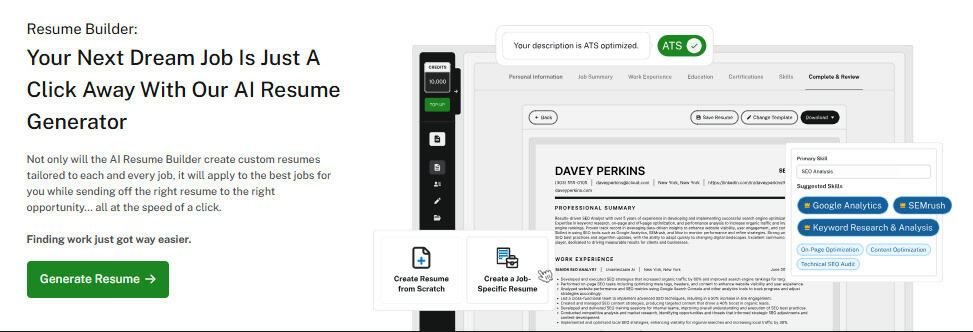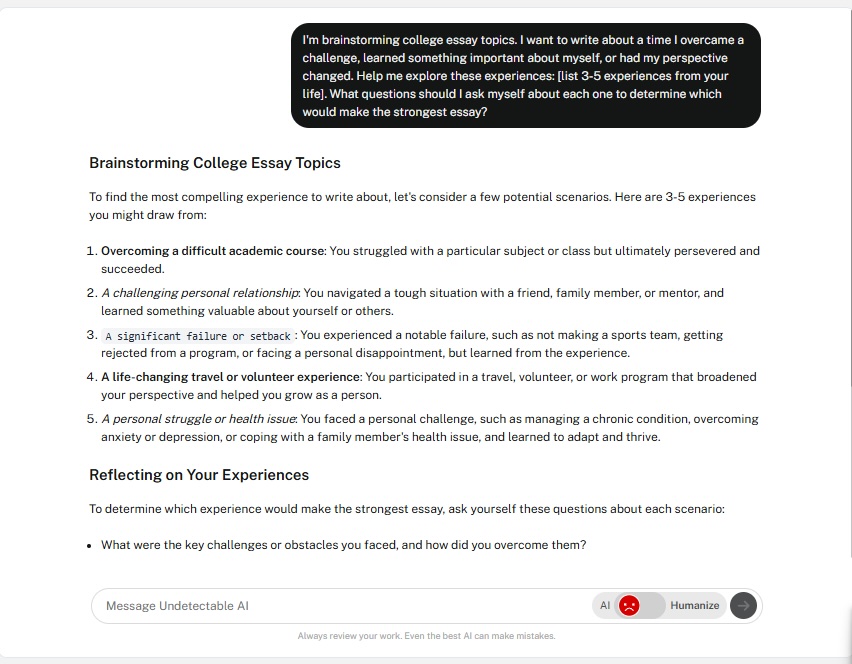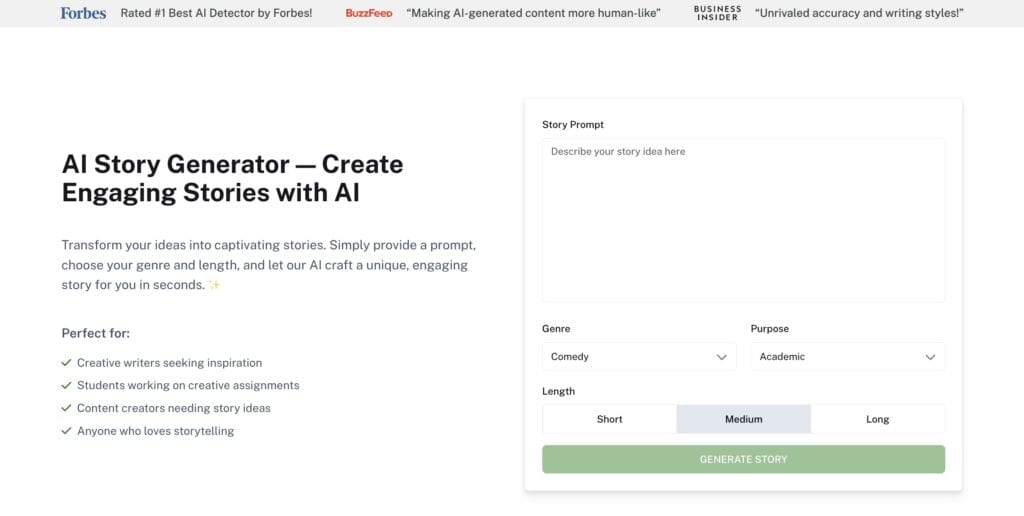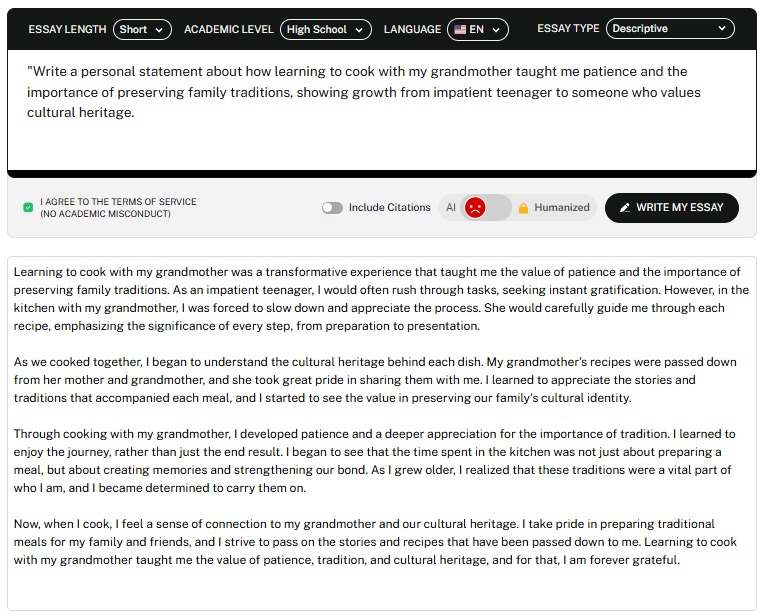To be young and full of options is the best feeling ever. But once you realize you have to write your college essay?
Things don’t seem so fun anymore.
It might feel like climbing the steepest mountains in flip-flops. After all, it feels like your entire future is on the line.
It’s your chance to show admissions who you are beyond your GPA and test scores. Think of it as your personal highlight reel, but in written form.
The good news? Thousands of students nail their essays every year.
The secret? Not just confidence, but tools and guidelines.
We’ll walk through everything from brainstorming to final edits, with real examples and practical tools to make the process less stressful.
Key Takeaways
- College essays are typically 250-650 words and focus on personal experiences
- Strong essays show growth, self-reflection, and authentic voice
- The structure matters: compelling hook, clear narrative, meaningful conclusion
- Brainstorming and outlining prevent writer’s block and strengthen your story
- Multiple drafts and careful editing are essential for success
- AI tools can help with brainstorming, writing, and polishing your essay
What Is a College Essay?
A college essay is your personal story, your resume told in a way that connects with admissions officers.
It’s not a research paper or a book report. It’s you, on paper, showing what makes you stand out.
Most college essays fall into two categories: the personal statement and supplemental essays. The personal statement is your main essay that goes to multiple schools.


Never Worry About AI Detecting Your Texts Again. Undetectable AI Can Help You:
- Make your AI assisted writing appear human-like.
- Bypass all major AI detection tools with just one click.
- Use AI safely and confidently in school and work.
Supplemental essays are specific to each college, often asking “Why do you want to attend this school?” or similar questions.
The goal isn’t to impress with fancy vocabulary or complex theories. Admissions officers read thousands of essays, which means they want authentic voices and genuine stories.
They want to understand your values, your perspective, and how you handle challenges.
Think about it this way: grades show what you can do academically.
Essays show who you are as a person. That’s why they matter so much in the admissions process.
Also, if you want your college application to feel complete, your written story should be supported by a clean record of your activities and honors.
You can use Undetectable AI’s Resume Generator to help college students build their first professional resume using academic achievements and internship data, ensuring your extracurricular background is presented as professionally as your essay.

How Long Should a College Essay Be?
Most college essays have strict word limits.
The Common Application personal statement allows 650 words maximum. Supplemental essays usually range from 150 to 500 words, depending on the school.
Here’s the golden rule: respect the word limit. Going over shows you can’t follow directions.
Going way under suggests you didn’t put in enough effort. Aim for 90–100% of the maximum word count for personal statements, and at least 75% for shorter supplemental essays.
Don’t pad your essay with fluff to hit word counts. Every sentence should serve a purpose.
If you’re struggling to reach the minimum, you probably need to dig deeper into your story or add more specific details.
Brainstorming Your College Essay Topic
The blank page is your enemy. But brainstorming the right way can turn that enemy into your best friend. The key is generating lots of ideas without judgment.
Start with this simple exercise: list 20 moments that shaped you. Don’t overthink it. Include everything from major life events to small daily moments.
That time you got lost in a new city. Your grandmother’s cooking lessons. The book that changed your perspective.
Here’s where AI can really help. You can use a tool like Undetectable AI’s AI Chat tool to brainstorm and refine your ideas.

The AI will help you dig deeper, revealing the experiences that show real growth, highlight your values, and showcase how you think.
To truly stand out, essays must feature authentic narrative examples that reveal personal character and values.

You can use our Story Generator to produce authentic narrative examples for college essays that stand out by focusing on unique, high-impact scenarios.
Avoid the overdone topics (like winning the big game or the loss of a grandparent) unless you have a perspective so unique it can’t be replicated.
Ask yourself:
- What obstacles did I face, and how did I overcome them?
- How did this shape my character, values, or goals?
- What skills or strengths emerged from this experience?
- How can I tell the story vividly so the reader feels the emotion and stakes?
By using AI to guide your reflection, you’ll quickly pinpoint the experiences with the most depth and potential, then be able to shape them into a compelling, one-of-a-kind college essay.
How to Structure & Outline a College Essay
A strong college essay follows a clear structure, but it doesn’t feel formulaic.
Think of it as a mini-movie with a beginning that hooks the reader, a middle that develops your story, and an ending that brings everything together.
Here’s a simple but effective structure:
Hook (1-2 sentences): Start with something that makes the reader want to keep reading. This could be a surprising statement, vivid scene, or intriguing question.
Context (2-3 sentences): Briefly set up the situation or background the reader needs to understand your story.
Development (3-4 paragraphs): Tell your story with specific details and show how you grew or what you learned. This is the meat of your essay.
Reflection (1-2 paragraphs): Connect your experience to who you are today and what you bring to college.
Conclusion (2-3 sentences): End with something memorable that ties back to your opening or looks toward the future.
Let’s see this in action with a “Why This College” essay outline:
(Hook) The first time I walked across Eastwood University’s courtyard, the smell of espresso mixed with ocean air hit me. It felt like a place where ideas travel as freely as the breeze.
(Context) Growing up in California, I have been lucky to live in a place where cultures overlap, from taco trucks in Los Angeles to Lunar New Year parades in San Francisco. But my hometown still has its limits, and I have been craving a college that pushes me into deeper, more global conversations.
(Development) In high school, I joined Model UN to hear perspectives beyond my zip code. I volunteered at a local refugee center, helping newcomers practice English while they taught me phrases in their native languages. I started a small podcast with friends, interviewing people from different cultural backgrounds about their journeys to California.
When I found Eastwood’s International Studies program, something clicked. The way it blends political science, economics, and cultural studies mirrors how I like to connect the dots. Professor Liu’s work on sustainable development in Southeast Asia reminds me of my own senior project on ethical supply chains in California’s agriculture industry.
Outside the classroom, Eastwood’s Global Living Learning Community feels like a dream. I imagine late-night conversations in the dorm kitchen over homemade lumpia or tamales, swapping recipes and stories from opposite sides of the world.
(Reflection) Eastwood is not just where I would study international relations, it is where I would live them. I would bring my California openness, curiosity, and collaborative spirit into every class, group project, and campus event.
(Conclusion) Starting at the Pacific Coast and continuing to Eastwood’s campus, I am ready to carry my voice, my questions, and my stories into a place that values global thinking as much as I do.
Writing the First Draft
Now comes the fun part: actually writing your essay. Don’t aim for perfection on the first draft.
Your goal is to get your story down on paper, and you can polish it later.
This is where Undetectable AI’s Essay Writer tool becomes incredibly helpful. It can help you transform your outline into a full draft while maintaining your authentic voice.
When using the Essay Writer tool, here are the settings you’ll want to choose:
- Essay Length: Select “Custom” and input your target word count (typically 500-650 words for personal statements)
- Academic Level: Choose “High School”
- Language: Select “EN” for English
- Essay Type: Choose Descriptive or Persuasive
For your topic or prompt, be specific. Instead of just “college essay,” try something like: “Write a personal statement about how learning to cook with my grandmother taught me patience and the importance of preserving family traditions, showing growth from an impatient teenager to someone who values cultural heritage.”

The AI will generate a draft that captures your story structure. You’ll then personalize it with your specific details, voice, and experiences.
Remember, the AI is your writing assistant, not your ghostwriter. Your authentic voice and personal details make the essay yours.
Start writing without worrying about perfect word choices or flawless grammar. Set a timer for 30–45 minutes and just write. Let your thoughts flow.
If you get stuck, refer back to your outline or brainstorming notes.
Write like you talk (but a little more polished). College essays should sound like you, not like a textbook.
If you wouldn’t use the word “plethora” in conversation, don’t use it in your essay.
Editing and Revising Your Essay
Your first draft is just raw material. The real magic happens during revision, which is where good essays become great essays.
Start with big-picture revisions first.
Does your essay tell a complete story? Does it show growth or insight? Is your personality coming through? Don’t worry about grammar and spelling yet.
Focus on content and structure.
Read your essay out loud, and it’ll help you catch awkward sentences and places where the flow breaks down. If you stumble while reading, your reader will stumble too.
Here’s a sample essay excerpt that needs revision:
“I always been interested in science and math since I am a young child. In highschool I take advance classes and get good grade. I participate in science fair and win second place. I think I be a good fit for your engineering program because I works hard and I smart. I have leadership experiences from being class president. I believe I can contributes to your school in many way.”
This paragraph has several issues: it’s unclear, lacks specific details, and doesn’t show personality or growth.
Let’s see how Undetectable AI’s Grammar Checker can help identify and fix these problems.

The Grammar Checker quickly flags errors that weaken clarity and flow. It identifies:
- Incorrect verb forms and subject-verb agreement (e.g., “I works hard” should be “I work hard”)
- Missing articles and prepositions (e.g., “participated in science fair” should be “participated in the science fair”)
- Awkward or redundant phrasing (e.g., “I have always been interested… since I was a young child” can be streamlined)
- Spelling errors (e.g., “highschool” should be “high school”)
- Repetitive sentence structure that makes writing sound flat and monotonous
But beyond grammar, you’ll want to revise for content and tone so your essay feels authentic.
This is where Undetectable AI’s AI Humanizer can help.
It takes technically correct sentences and makes them sound more natural, personal, and engaging, like something you would actually say in conversation.
Replace generic statements with vivid, specific examples. Instead of “I work hard,” describe the late nights you spent troubleshooting a robotics project until it finally worked.
Rather than “I am smart,” show your intelligence through problem-solving moments, creative solutions, or insights that reveal how you think.
A humanized essay connects with the reader on an emotional level.
Take breaks between revision rounds, because fresh eyes will catch gaps in storytelling or tone.
Print out your draft if possible, as reading on paper often reveals awkward phrases or missing emotional beats that a screen might hide.
15 Strategies For Writing the Perfect College Essay

Here are some strategies that separate memorable essays from forgettable ones:
- Show, don’t tell. Instead of saying you’re compassionate, describe a moment when you helped someone.
- Use specific details. Replace “I went to the store” with “I walked three blocks to Corner Market in the rain.”
- Start with action. Jump right in instead of providing a lengthy back story.
- Focus on one moment or experience. Deep is better than broad.
- Write in your authentic voice. Sound like you, not like what you think admissions officers want to hear.
- Choose meaningful topics. Pick experiences that genuinely changed or revealed something about you.
- Avoid the thesaurus trap. Simple, clear language beats unnecessarily complex vocabulary.
- Connect to your future. Show how your past experiences prepare you for college and beyond.
- Be vulnerable (appropriately). Share struggles and growth, but maintain boundaries.
- Use active voice. “I discovered” is stronger than “It was discovered by me.”
- End with impact. Your conclusion should leave the reader thinking about you.
- Read essays from your target schools. Many colleges publish successful essays from previous years.
- Get feedback from others. Teachers, counselors, and trusted friends can offer valuable perspectives.
- Revise multiple times. Great essays are written and rewritten, not just written.
- Proofread ruthlessly. Typos and grammar errors distract from your message.
When writing a college application essay, remember that admissions officers want to admit students who they feel will thrive at their school.
Your essay should demonstrate qualities like curiosity, resilience, leadership, and the ability to contribute to campus life.
For personal essays for college, focus on experiences that reveal your character. The challenge you overcame matters less than how you grew from it.
A small moment that led to big insights can be more powerful than a dramatic life event that you haven’t fully processed.
Sample College Essay Topics and Hooks
Sometimes the hardest part is knowing where to start. Here are proven topic categories with example hooks to spark your creativity:
Overcoming Challenges:
- Hook: “The first time I failed a test, I cried in the bathroom for twenty minutes.”
- Hook: “My stutter used to define me. Now it refines me.”
Cultural Identity:
- Hook: “I speak three languages fluently, but sometimes I feel fluent in none.”
- Hook: “My name has seventeen letters, and each one tells a story.”
Intellectual Curiosity:
- Hook: “I’ve read the same book twelve times, and I discover something new each time.”
- Hook: “The question that changed my life had only three words: But why, though?”
Community Service:
- Hook: “Working at the homeless shelter taught me more than I ever taught anyone there.”
- Hook: “I used to think helping meant fixing. I was wrong.”
Family Influences:
- Hook: “My dad’s job rejection letter sits framed on our kitchen wall.”
- Hook: “Sunday dinners at my house sound like the United Nations.”
Personal Growth:
- Hook: “I used to be the person who never raised their hand.”
- Hook: “My biggest fear became my greatest teacher.”
Creative Pursuits:
- Hook: “I paint my emotions because words aren’t enough.”
- Hook: “The guitar my grandfather gave me has six strings and a thousand stories.”
Academic Interests:
- Hook: “I fell in love with calculus in the frozen food aisle.”
- Hook: “Chemistry makes sense to me in ways that people sometimes don’t.”
Remember, these are just starting points. Your specific experiences and personal voice will make any topic uniquely yours.
The best essays often come from unexpected angles on common experiences.
You can explore additional tools here, or give our AI Detector and Humanizer a try in the widget below!
From Ugh to Accepted
Writing a college essay doesn’t have to be torture.
Yes, it’s challenging. Yes, it matters. But thousands of students write successful essays every year, and with the right approach, you’ll join them.
Remember the key ingredients: authentic voice, specific details, clear structure, and genuine insight.
Your essay should sound like you and show admissions officers something they can’t learn from the rest of your application.
And don’t forget to use the tools available to you. Undetectable AI can help with brainstorming, drafting, and editing, but your personal experiences and voice make the essay yours.
Don’t try to write what you think admissions officers want to hear. Write what’s true for you.
Take your time with the process. Good essays marinate. They get better with each revision. Start early, write multiple drafts, and get feedback from people you trust.
With Undetectable AI’s AI Grammar Checker, AI Essay Writer, AI Chat, and AI Humanizer, you can refine every draft, improve clarity, and keep your authentic voice intact.
Most importantly, trust yourself. You have stories worth telling and insights worth sharing.
Your job is to put them on paper in a way that connects with your reader.
